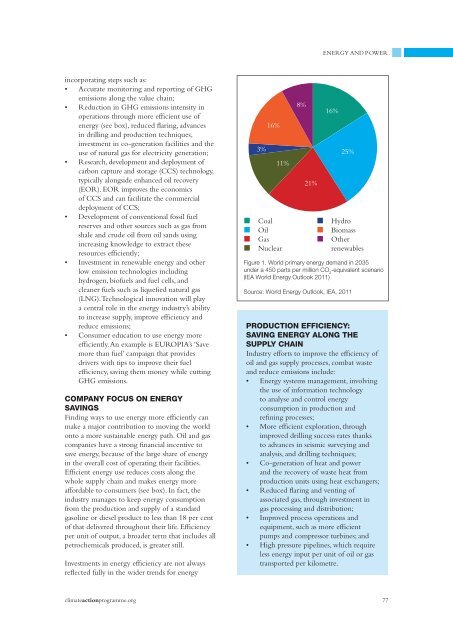Climate Action 2012-2013
Create successful ePaper yourself
Turn your PDF publications into a flip-book with our unique Google optimized e-Paper software.
ENERGY AND POWER<br />
incorporating steps such as:<br />
Accurate monitoring and reporting of GHG<br />
emissions along the value chain;<br />
Reduction in GHG emissions intensity in<br />
operations through more efficient use of<br />
energy (see box), reduced flaring, advances<br />
in drilling and production techniques,<br />
investment in co-generation facilities and the<br />
use of natural gas for electricity generation;<br />
Research, development and deployment of<br />
carbon capture and storage (CCS) technology,<br />
typically alongside enhanced oil recovery<br />
(EOR). EOR improves the economics<br />
of CCS and can facilitate the commercial<br />
deployment of CCS;<br />
Development of conventional fossil fuel<br />
reserves and other sources such as gas from<br />
shale and crude oil from oil sands using<br />
increasing knowledge to extract these<br />
resources efficiently;<br />
Investment in renewable energy and other<br />
low emission technologies including<br />
hydrogen, biofuels and fuel cells, and<br />
cleaner fuels such as liquefied natural gas<br />
(LNG). Technological innovation will play<br />
a central role in the energy industry’s ability<br />
to increase supply, improve efficiency and<br />
reduce emissions;<br />
Consumer education to use energy more<br />
efficiently. An example is EUROPIA’s ‘Save<br />
more than fuel’ campaign that provides<br />
drivers with tips to improve their fuel<br />
efficiency, saving them money while cutting<br />
GHG emissions.<br />
COMPANY FOCUS ON ENERGY<br />
SAVINGS<br />
Finding ways to use energy more efficiently can<br />
make a major contribution to moving the world<br />
onto a more sustainable energy path. Oil and gas<br />
companies have a strong financial incentive to<br />
save energy, because of the large share of energy<br />
in the overall cost of operating their facilities.<br />
Efficient energy use reduces costs along the<br />
whole supply chain and makes energy more<br />
affordable to consumers (see box). In fact, the<br />
industry manages to keep energy consumption<br />
from the production and supply of a standard<br />
gasoline or diesel product to less than 18 per cent<br />
of that delivered throughout their life. Efficiency<br />
per unit of output, a broader term that includes all<br />
petrochemicals produced, is greater still.<br />
Investments in energy efficiency are not always<br />
reflected fully in the wider trends for energy<br />
3%<br />
16%<br />
11%<br />
Coal<br />
Oil<br />
Gas<br />
Nuclear<br />
8%<br />
21%<br />
16%<br />
25%<br />
Hydro<br />
Biomass<br />
Other<br />
renewables<br />
Figure 1. World primary energy demand in 2035<br />
under a 450 parts per million CO 2<br />
-equivalent scenario<br />
(IEA World Energy Outlook 2011)<br />
Source: World Energy Outlook, IEA, 2011<br />
PRODUCTION EFFICIENCY:<br />
SAVING ENERGY ALONG THE<br />
SUPPLY CHAIN<br />
Industry efforts to improve the efficiency of<br />
oil and gas supply processes, combat waste<br />
and reduce emissions include:<br />
Energy systems management, involving<br />
the use of information technology<br />
to analyse and control energy<br />
consumption in production and<br />
refining processes;<br />
More efficient exploration, through<br />
improved drilling success rates thanks<br />
to advances in seismic surveying and<br />
analysis, and drilling techniques;<br />
Co-generation of heat and power<br />
and the recovery of waste heat from<br />
production units using heat exchangers;<br />
Reduced flaring and venting of<br />
associated gas, through investment in<br />
gas processing and distribution;<br />
Improved process operations and<br />
equipment, such as more efficient<br />
pumps and compressor turbines; and<br />
High pressure pipelines, which require<br />
less energy input per unit of oil or gas<br />
transported per kilometre.<br />
climateactionprogramme.org 77












